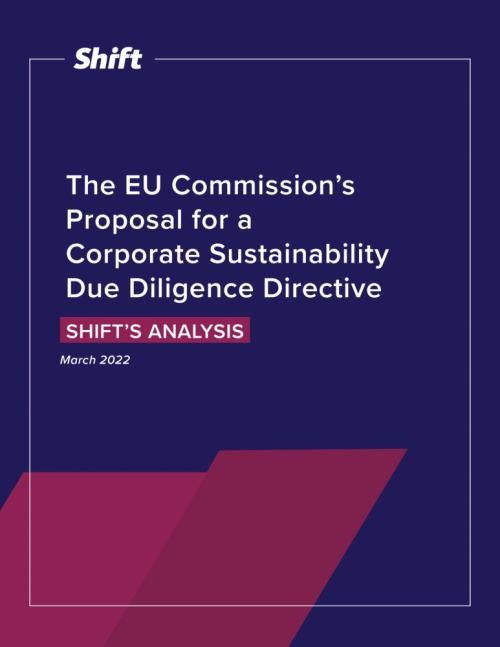
https://shiftproject.org/resource/eu-csdd-proposal/shifts-analysis/
Shift welcomes the EU stepping into a leadership position on the need for mandatory measures to increase the breadth and depth of human rights and environmental due diligence, given the urgency of the sustainable development challenges facing us all. The Commission’s initiative is an opportunity with few parallels in terms of its potential to drive sustainability into the heart of how business gets done . The UN Guiding Principles on Business and Human Rights (UNGPs) are the authoritative global standard on how to prevent and address business-related human rights harms. They expect states to adopt a smart mix of measures, mandatory and voluntary, national and international, to drive meaningful change in business behavior. The OECD Guidelines for Multinational Enterprises (OECD Guidelines) are aligned with the UNGPs and cover a broader range of topics in addition to human rights, including the environment, and are supported by general and sector-specific guidance. The ILO Tripartite Declaration of Principles concerning Multinational Enterprises and Social Policy reinforces these expectations specifically in relation to due diligence regarding labor rights. ”
With the right framing, a Directive could advance better outcomes for people and planet by scaling quality due diligence processes that focus on the most severe human rights and environmental risks, encouraging creative forms of individual and collaborative leverage by companies to tackle risks across their value chains, enhancing internal governance and accountability on sustainability risks, and expanding pathways to remedy for those harmed by business activity. However, for these significant opportunities to be realized, and for the Directive to meet its stated ambition, it is critical that the Directive is firmly grounded in the key international standards on sustainability due diligence adopted by the UN and the OECD.
In analyzing the Commission’s proposal, we compare central elements of the draft Directive against the soft law standards contained in the UN Guiding Principles on Business and Human Rights and OECD Guidelines for Multinational Enterprises. We focus on those areas where we believe that a lack of alignment with the international standards will hinder the Directive’s ability to meet its stated objectives, and we provide our initial thoughts on how they could best be addressed. This analysis presents our five key reflections on the matter.










Add new comment